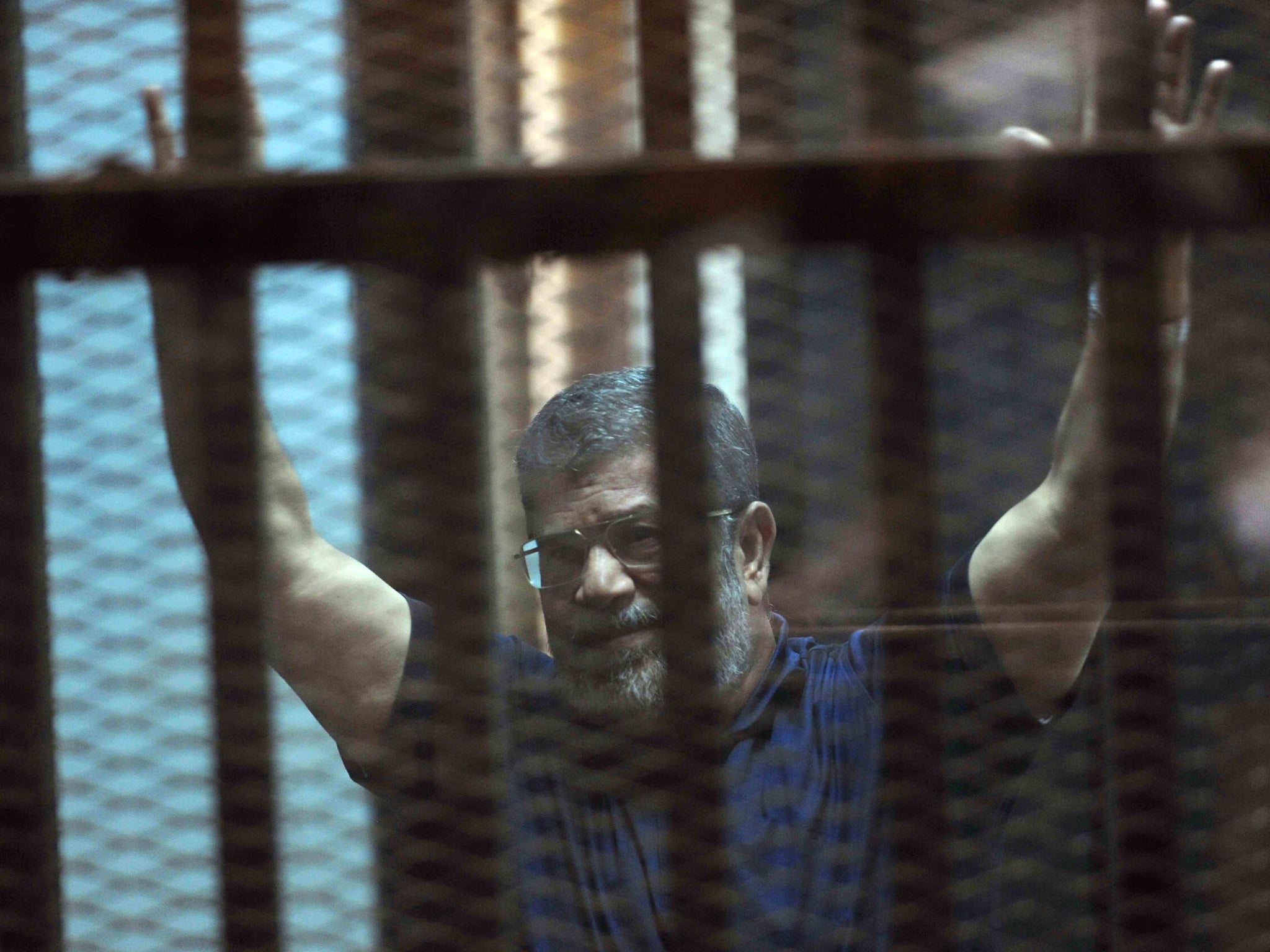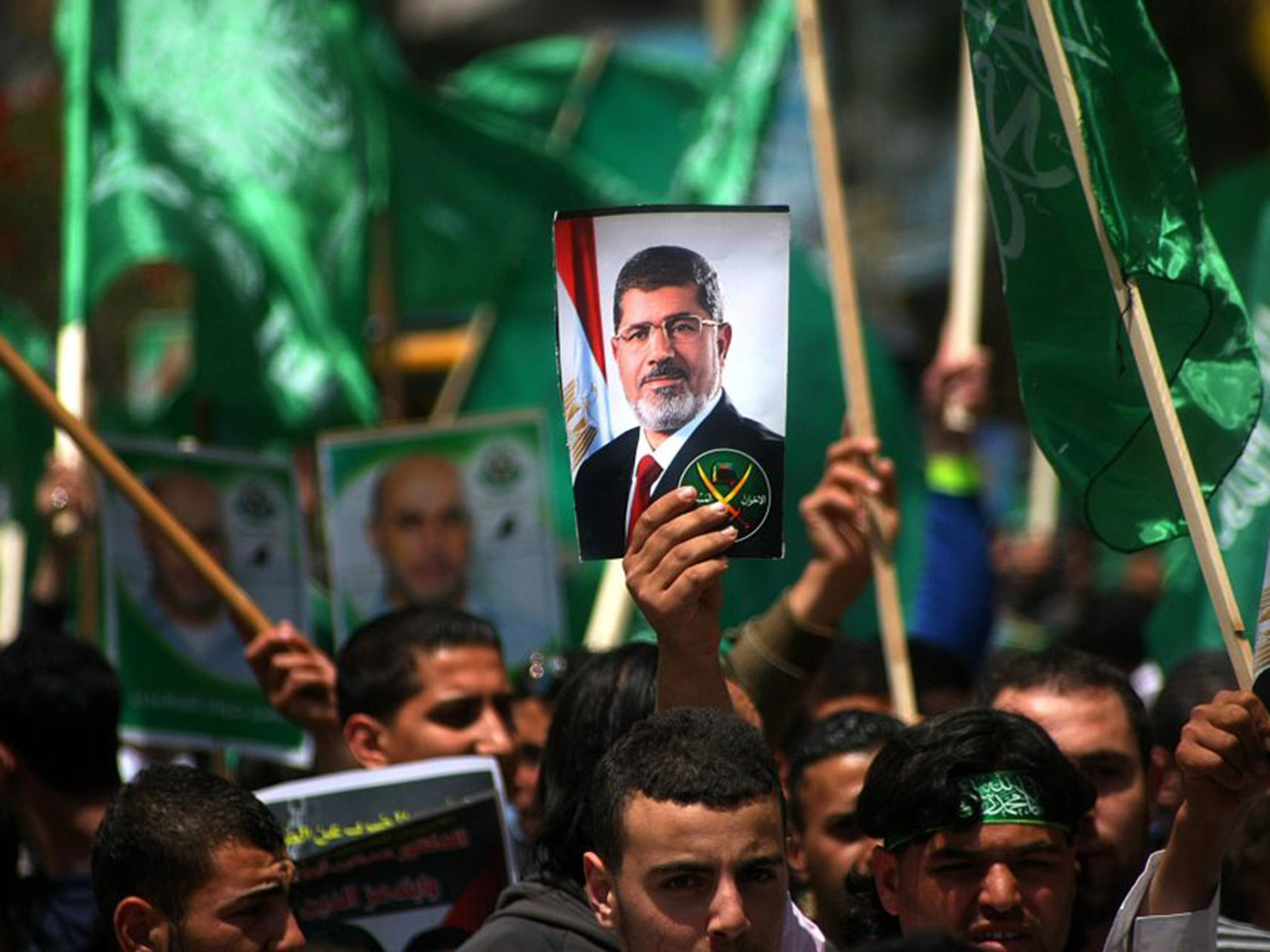Mohamed Morsi: Egypt's first democratically elected president sentenced to death along with over 100 defendants
The cluster of defendants held inside a cage shouted on hearing the news that Morsi, along with 105 others, was convicted of breaking out of prison

An Egyptian court sentenced ousted President Mohammed Morsi and more than 100 others to death over a mass prison break during the 2011 uprising that toppled Hosni Mubarak and later brought Morsi’s Islamist movement to power.
The cluster of defendants held inside a frosted glass and metal cage shouted on hearing the news that the former President. Morsi, along with 105 others, was convicted of breaking out of Wadi il-Natroun prison. The prosecution alleged that foreign fighters from Gaza had entered Egypt, and coordinated a mass jailbreak from three prisons using heavy weapons. They argued that the fleeing prisoners looted and destroyed property as well as committed murder.
The defendents inside the courthouse of Cairo’s Military Academy were dressed in red, blue and white jumpsuits denoting whether prisoners are on death row, sentenced to jail or awaiting sentencing.
Chants of “down with the military regime,” intermittently pierced the thick walls of the cage, with Morsi himself obscured from view in a separate chamber. Along with Brotherhood leaders Mohammed El-Beltagy, Khairat El-Shater and 33 others, Morsi was also convicted of “conspiring with foreign powers”, namely the Palestinian Hamas faction, to destabilise Egypt. Fourteen of those convicted, plus Morsi, received the death penalty.

Morsi, Egypt’s first freely elected leader, was ousted by the military in July 2013 following days of mass street protests over his tenure. Morsi’s successor, Abdel Fattah al-Sisi, went from military chief to ruler, his position confirmed by an election last year.
The court set 2 June as the date where, as is customary, Egypt's top religious authority the Grand Mufti will confirm or commute the death sentences. A confirmation is not legally binding, and Morsi and other defendants can still appeal the sentences - which would involve them being hung.
Mohamed El Damati, one of several lawyers representing Morsi, branded the verdict “totally unfair,” in conversation with the Independent on Sunday. “There is no evidence to prove his guilt - when the prison was open, he left like everyone else,” he said. “Nothing here is documented. [Former Interior Minister] Mohamed Ibrahim said there were no charges against Morsi while he was in power. If the Grand Mufti approves the death penalty on 2nd June, we will go to the appeals court.”
Amnesty International called the court decision “a charade based on null and void procedures” and demanded Morsi’s release or retrial in a civilian court. Muslim Brotherhood officials called for the international community to take action. Turkish President Recep Tayyip Erdogan criticized Morsi’s death sentence, saying the government was returning to the “old Egypt” by rolling back democracy. He also criticised the West, saying it had failed to speak out against Mr Sisi or death sentences being handed down to Brotherhood leaders.
The former president had already been sentenced last month to 20 years in prison in a separate case, on charges linked to the killing of protestors outside a Cairo presidential palace in December 2012. Morsi is also awaiting sentencing in a case that alleges he passed state secrets to foreign groups.
On the streets of the village of Nahia the day before the verdict, feelings were running high. Nahia, a desperately poor agricultural village in Giza of 50,000 people, has long been a stronghold of support for the Muslim Brotherhood, even in the face of a crackdown on the group which has rendered any form of support illegal.
Around 200 villagers marched through the unpaved dusty streets, holding signs showing the four-finger salute denoting the Raba’a Adawiya tent encampment, whose violent dispersal has become symbolic of the crackdown on the Brotherhood. Protestors handed out leaflets which read: “in the time of Morsi, we always had enough wheat. In the time of Sisi, we have had enough killing.”
“Mohammed Morsi is a red line,” said one protestor, who argued that the government had no right to harm the deposed President.” Asked about what kind of reaction to expect to a death sentence for Morsi, he warned that “things might get out of control,” but said that nothing specific had been organised.
Another man, who also declined to give his name, watched his cousin protest as he sat outside a local mechanic. “I’m not Brotherhood, I’m against them,” he explained, pointing to how the government crackdown on local Brotherhood members has plagued the village. “They have ruined our lives,” he added.
Join our commenting forum
Join thought-provoking conversations, follow other Independent readers and see their replies
Comments
Bookmark popover
Removed from bookmarks